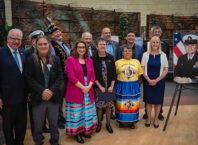FINAL ROUND OF PAYMENTS MADE IN COBELL
SETTLEMENT
HELENA, MT – Hundreds of thousands of
Native Americans received the final cash payments the week of Sept.
16 from one of the largest government settlements in U.S. history,
about three years after the deal was approved.
Checks ranging from $869 to $10
million were sent beginning on Sept. 16 to more than 493,000 people
by the administrators of the $3.4 billion settlement from a
class-action lawsuit filed by the late Elouise Cobell of Browning,
Mont. Approximately $941 million was distributed in this second round
of payments.
Cobell, the former Blackfeet tribal
treasurer, sued after finding the government squandered billions of
dollars in royalties for land it held in trust for individual Indians
that was leased for development, exploration or agriculture. The
mismanagement stretched back to the 1880s, the lawsuit found. She
died of cancer in 2011, after more than 15 years of doggedly pursuing
the lawsuit, rallying Native Americans around the cause and lobbying
members of Congress for its approval.
Cobell was present when a federal
judge approved the settlement just months before her death. But it
took years to work through the appeals and then sort through
incomplete and erroneous information provided by the government to
identify all the beneficiaries. Some 22,000 people listed in the data
provided had died, while 1,000 more listed as dead were still alive,
according to officials.
The payments are the second of two
distributions in the settlement. The first distributions of $1,000
apiece went to more than 339,000 people. This second, final round of
distributions is based on a formula looking at 10 years of the
highest earnings on those individual landowners’ accounts.
The settlement also includes a $1.9
billion land buy-back program now underway in which willing
landowners sell the government their land allotments to be
consolidated and turned over to the tribes.
TRIBES PETITION GOVERNMENT TO RETURN
BOARDING SCHOOL LAND
RAPID CITY, S.D. – Sixteen tribes
from South Dakota, North Dakota and Nebraska want the federal
government to turn over to tribal care the three parcels of land
where an American Indian boarding school sat in the late 1800s.
The Great Plains Tribal Chairmans
Association, along with other tribal governments and citizens,
petitioned the government to release the roughly 165 acres of land to
federal tribal trust, on Sept. 26. The tribes consider the parcels as
spiritual land guaranteed to the Sioux Nation under the 1868 Treaty
of Fort Laramie.
The boarding school opened its doors
in 1898 under federal assimilation policies. It was one of dozens of
government-operated schools where students were forced to speak
English and were punished when they were caught speaking in their
native languages.
Children from tribes in the Northern
Plains were funneled into roughly 1,200 acres dedicated by the
federal government to the Rapid City Indian Boarding School. A 1928
government-commissioned report found that Indian children at boarding
schools were severely punished, malnourished, overworked and poorly
educated. The failed school closed in 1933 and the land eventually
was dissolved into the lots that remain under tax-free federal trust.
Only the Sioux San Hospital, an
original structure of the facility, continued to operate when the
school was shuttered. According to the association’s executive
director, Gay Kingman, while there are no definite plans for the
acreage, she said the hospital would remain under control of the
Indian Health Service. She added that the hospital has been a focal
point for the Native American community.
“All of the tribes had people who
attended the boarding school,” Kingman said. “I can’t say
enough about what we’re trying to do here. The Sioux San Hospital
itself means so much to our people.”
PROJECT AIMS TO PRESERVE TRIBAL
LANGUAGES IN MONTANA
FORT BELKNAP, MT – A major effort is
underway to record Native American languages in Montana so they won’t
vanish completely.
Statistics show that out of about
6,000 residents of Montana’s Native communities, there may be five
percent or fewer actual speakers of traditional tribal languages.
A recent grant from the Montana
Legislature resulted in a two-year pilot program for recording and
archiving these endangered languages.
"What we’re trying to do now is
get it electronic – make it more feasible make it more accessible
to everybody – not just in the schools here," Ray Cichosz,
Gros Ventre Tribe project coordinator said. "They could go on to
the Web site, they could go click on links. Say there’s Gros Ventre
living in Wyoming, Washington, California and they’re always
wondering, ‘My grandma was so and so. Where do I come from’?"
The video production phase of the
program was completed in September.
CATHOLIC WOMEN URGE ROME TO RENOUNCE
DOCTRINE OF DISCOVERY
NASHVILLE, TN – In August, the
Leadership Conference of Women Religious joined an effort to urge
Pope Francis to renounce a series of 15th century Catholic Church
documents used to justify colonization of the Americas and the forced
conversion and murder of indigenous peoples.
In November of last year, Sister
Maureen Fiedler hand-delivered a letter to Pope Francis’ ambassador
in Washington, D.C., calling on the pontiff to renounce the concept
of the “Doctrine of Discovery.” She doesn’t know if the letter
made it to the Vatican. But she’s hopeful the recent resolution by
LCWR will spur the pope to repudiate the doctrine.
The Doctrine of Discovery is a series
of papal bulls, or decrees, that gave Christian explorers the right
to lay claim to any land that was not inhabited by Christians and was
available to be “discovered.” If its inhabitants could be
converted, they might be spared. If not, they could be enslaved or
killed.
The doctrine’s modern influence
re-emerged recently in the debate about the racism and exploitation
of Native American sports mascots, Fiedler said. It has justified
efforts to eliminate indigenous languages, practices and worldviews
and it affects Native American sovereignty and treaty obligations.
Since 1823, it was enshrined in U.S.
law and in 2005, Supreme Court Justice Ruth Bader Ginsburg cited the
Doctrine of Discovery in a land-claim ruling against the Oneidas, one
of the six nations of the Haudenosaunee.
In August, LCWR members overwhelmingly
approved a resolution during its annual conference in Nashville,
Tenn.
Indigenous groups repeatedly sought to
overturn the doctrine since 1984. In its 2007 Declaration of the
Rights of Indigenous Peoples, the United Nations criticized policies
like the Doctrine of Discovery as “racist, scientifically false,
legally invalid, morally condemnable and socially unjust.”
LCWR’s resolution calls on the pope
to publicly acknowledge the continuing harm indigenous peoples
suffer; clarify and repudiate any remaining legal status of the
doctrine; dialogue with indigenous people and collaborate in planning
a sacred ceremony of reconciliation; and issue a pastoral statement
to courts of settler nations, urging them to change laws derived from
the doctrine.
The Vatican said that later bulls and
papal apologies show the church no longer supports the doctrine. “The
wrongs done to the indigenous people need to be honestly
acknowledged,” Saint John Paul II said in 1998. He also delivered a
sweeping apology in 2000 for the church’s mistreatment of groups,
including indigenous peoples.
SENATE PASSES BILL TO EXEMPT TRIBAL
WELFARE BENEFITS
WASHINGTON – The Senate passed a bill
Sept. 18 that would stop the Internal Revenue Service from taxing
tribal welfare benefits.
The House passed the bill by voice
vote earlier in the week and the Senate cleared it through a
unanimous consent agreement. The legislation was signed into law by
President Obama on Sept. 26.
Previously, the IRS doesn’t include
state and local welfare benefits as part of a person’s taxable
income, but because Native American tribal jurisdictions are not the
same as a state’s, the IRS has taxed tribal welfare benefits in the
past.
The Tribal General Welfare Exclusion
Act, H.R. 3043, would ensure that tribal housing assistance,
emergency medical care and education assistance are treated as
nontaxable income.
Senate Finance Committee Chairman Ron
Wyden (D-Oregon) said the bill is about parity and ensuring that
tribal members are treated the same as other federal taxpayers.
The bill also establishes a Tribal
Advisory Committee to help the Treasury Department and the IRS to
understand how best to address tax issues affecting Indian country.
Wyden said the legislation was necessary to stop aggressive IRS
audits that hindered economic and social development within tribal
communities.
“Tribal governments have a long
history of providing critical benefits to tribal members, and these
programs are fundamental to the sovereignty and cultural integrity of
tribes,” Wyden said. “Tribes, and not the IRS, are in the best
position to determine the needs of their members and provide for the
general welfare of their tribal citizens and communities.”
TRIBAL COURT CONVICTIONS MAY NOT COUNT
IN FEDERAL COURT
HELENA, MT – Federal prosecutors
can’t always use past tribal court convictions as proof of a
defendant’s criminal history, a panel of the 9th U.S. Circuit Court
of Appeals found in a Montana case.
The determination came on Sept. 30 as
the three-judge panel ruled that two federal counts of domestic
assault filed in 2011 against Michael Bryant, Jr. must be dismissed.
The judges said Bryant was convicted
of previous crimes in Northern Cheyenne Tribal Court and served time
in custody but didn’t have an attorney. The judges said those
convictions would not be considered legal under the Sixth Amendment
of the U.S. Constitution, which guarantees a defendant the right to
an attorney.
Northern Cheyenne tribal court rules
say defendants can hire their own attorneys but it does not guarantee
an attorney will be appointed.
The U.S. attorney’s office in Montana
argued that tribal courts aren’t governed by the U.S. Constitution,
and that Bryant’s convictions were legal under tribal law. The 8th
and 10th circuits have agreed with similar arguments.
While Justice Paul J. Watford agreed
with the decision in Bryant’s case, he argued the case law on which
the judges based their decision case should be revisited. He also
noted that the 9th Circuit is inconsistent because another decision
allows tribal court convictions to be used as a basis to charge
someone with being a felon in possession of a firearm, even if that
conviction didn’t meet Sixth Amendment standards.
The U.S. Attorney’s office could ask
for the entire court to consider the matter or seek to raise the
issue with the U.S. Supreme Court.
SIX CHEROKEE NATION NURSES AMONG
OKLAHOMA’S GREAT 100 NURSES
TAHLEQUAH, OK. – The Cherokee Nation
boasted six of its citizens named named as winners of the Great 100
Nurses of Oklahoma.
The national Great 100 Nurses
Foundation honors standout nurses for their contributions to health
care. The state of Oklahoma participated in the celebration for the
first time this year.
A dinner was held Sept. 30 for the
recipients at Hard Rock Hotel & Casino Tulsa. The honorees were
selected based on their contribution to the nursing profession and
for serving as role models after being nominated by patients, peers,
administrators or their community.
The six Cherokee recipients include:
Mona Brown, W.W. Hastings Hospital; Katherine Hollenbeck, Sam Hider
Jay Health Center; Marguerite Parker, W.W. Hastings Hospital; Dorothy
Snider-Peters, Cherokee Nation Home Health; Lisa Woodworth, Muskogee
Three-Rivers Health Center; and Sheryl Young, public health community
nurse.
“It’s an honor to get this award
since I’m just doing what I love to do,” Brown said. “Really,
every one of our nurses at Cherokee Nation deserves this award.”






